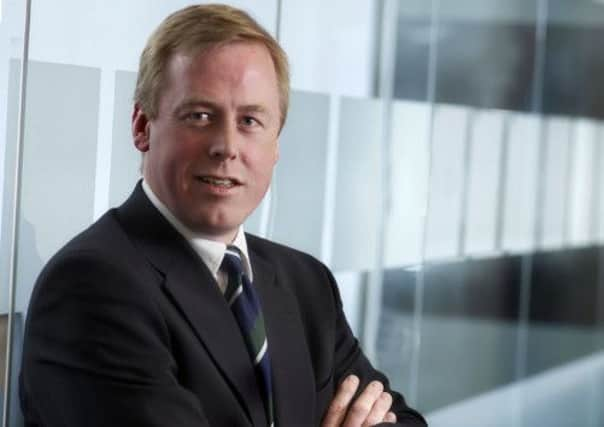Skipton warns on negative interest rates


This week, deputy Bank of England governor Paul Tucker floated the idea of negative interest rates when he was asked by lawmakers about what more the BoE could do to stimulate growth.
But BoE policymaker Charles Bean said these discussions about charging banks to park their money at the central bank to get them to lend more to firms were “blue sky thinking” and the BoE had no plan to introduce so-called negative interest rates now.
Advertisement
Hide AdAdvertisement
Hide AdDavid Cutter, Skipton chief executive, said: “I would be concerned if they applied negative interest rates to deposits held by building societies with the Bank of England. We hold those deposits there for prudential purposes in terms of ensuring we have the highest quality of liquidity that is available on a daily basis.
“If they paid negative interest rates on that it would be the consumer that suffered. It would mean further reduction in retail savings rates and potentially higher borrowing rates and I can’t see how reducing savings rates further would help stimulate the economy because savers just have less money to spend, so conversely it would be counter-productive, particularly in the building society sector which was a ray of hope last year in terms of the vast majority of the growth in net lending coming from building societies.”
Annual accounts for 2012 showed Skipton’s mortgages and savings division reversed a pre-tax loss of around £13m in 2011 to record pre-tax profits of £4.9m.
Mr Cutter said: “The main driver for that was that the interest rate margin within the division increased from 51 basis points to 60 basis points and the main reason for that was on the back of good lending.”
Advertisement
Hide AdAdvertisement
Hide AdNet lending for the group amounted to £356m, compared to £412m in 2011, of which £304m was in the UK, representing 4.1 per cent of the growth in the UK residential mortgage market compared to a natural market share of 0.8 per cent. Mr Cutter said that net lending was still “substantially above our natural market share, just slightly less than the prior year”. Skipton saw a £0.2bn rise in savings balances to £9,462.4m in 2012, while its gross mortgage lending was £1.5bn for the year, following a three-fold uplift to £1.7bn in 2011. Mortgage balances rose by 3.5 per cent during the year to £10.5bn.
Skipton, the UK’s fourth largest building society, said that the mortgage and savings division’s return to profitability was achieved despite a £6.1m contribution to the Financial Services Compensation Scheme.
Skipton said it has around 744,000 members, compared to 760,000 in 2011. It said the drop was “as a result of a strategy of prudent growth in response to current market conditions”, but added that it plans to gradually increase membership this year and beyond.
Connells, the group’s estate agency division, contributed profits of £36.2m to the group, compared to £35.8m in 2011, which the society described as “an impressive result given another flat UK housing market in 2012”.
Advertisement
Hide AdAdvertisement
Hide AdMr Cutter said it has been “an encouraging start to the year” for the UK housing market, adding that the BoE’s Funding for Lending Scheme, which opened at the start of August 2012, has resulted in greater mortgage credit availability. Mr Cutter said the society has started to draw down from the scheme, which offers banks and mutuals cheap finance if they lend on to households and businesses, but didn’t disclose figures.
The Skipton group employs 8,400 people, the majority of whom are in Connells. The society has 100 branches.
The group’s mortgage servicing business, Homeloan Management Ltd (HML), also moved back into profit, achieving pre-tax profits of £800,000 after a pre-tax loss of £3.1m during 2011.
Mr Cutter said: “It had a good turnaround in performance last year, returned to profitability and it has been successful in gaining a number of new clients and extending existing contracts with existing customers so it’s got a bright future.”
Advertisement
Hide AdAdvertisement
Hide AdHML has been the subject of market speculation about a possible sale in the past, but Mr Cutter declined to comment.
The group’s financial advice division incurred a pre-tax loss of £900,000, compared to a pre-tax profit of £2.9m in 2011. It said revenue generated by the businesses in the division increased during 2012, but it incurred charges in relation to commission rebate.
The group’s investment portfolio reported a pre-tax loss of £3.9m compared to a pre-tax profit of £1.3m in 2011. It said the majority of the loss emanated from its investment in Sterling International Brokers, which it has since sold.
Total assets of the society at the end of December 2012 were £13.8bn, compared to £13.9bn in the previous year. Total income for the group increased by 9 per cent to £491.5m, while administrative expenses rose by 7 per cent to £410.1m.
Advertisement
Hide AdAdvertisement
Hide AdCharges for bad debts more than halved from £30m in 2011 to £12.3m in 2012. Skipton said its core tier one capital ratio – a measure of strength – was up from 10.5 per cent to 11.1 per cent at the end of 2012 compared to a year previously. It said the quality of its liquidity remains “excellent” with no exposure to Greece, Ireland, Italy, Portugal and Spain.